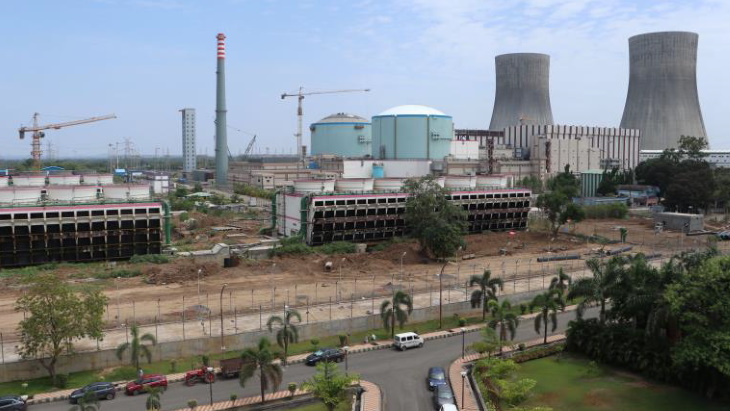The first Indian-designed 700 MWe pressurised heavy water reactor (PHWR) has begun commercial operation in Gujurat - almost three years after reaching first criticality.

Under construction: Kakrapar 3 and 4 pictured in July 2020 (Image: Nuclear Power Corporation of India Ltd)
Kakrapar 3 is one of four 700 MWe PHWR units that received approval from the Indian government in 2007, alongside Kakrapar unit 4 and Rawatbhata units 7 and 8, in Rajasthan. Construction of the Kakrapar units formally began after site works were completed in 2010, and at that time the first unit was expected to be online by 2017. Kakrapar 3 achieved first criticality in July 2020, and the unit was connected to the grid in January 2021.
According to media reports citing a "senior official" at the power plant, Kakrapar 3 was declared in commercial operation on 30 June at 10am and was operating at 90% power.
In late 2022, Minister of State Jitendra Singh told the Lok Sabha - the lower house of the Indian parliament - that the Kakrapar project was expected to reach completion this year, with completion of Rawatbhata 7 and 8 expected in 2026.
The Indian government has sanctioned the construction of ten 700 MWe PHWRs - not including Kakrapar 3 and 4 and Rajasthan units 7 and 8 - to be built in "fleet mode" by the end of 2031. These are: Kaiga units 5 and 6 in Karnataka; Gorakhpur units 3 and 4 in Haryana; Chutka units 1 and 2 in Madhya Pradesh; and Mahi Banswara units 1 and 2 and units 3 and 4 in Rajasthan.
In addition, four Russian-supplied 1000 MWe VVER pressurised water reactors are under construction at Kudankulam: units 3 and 4, under construction since 2017, and units 5 and 6, under construction since 2021. A 500 MWe prototype fast breeder reactor is also under construction at Kalpakkam.
Researched and written by World Nuclear News